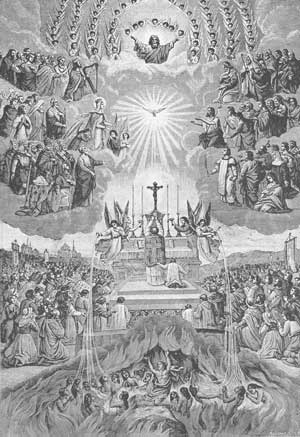Scripture consistently presents a binary view of the afterlife: heaven for the saved and hell for the unsaved. There is no intermediate state like purgatory described in the Bible.
- Luke 16:22-23: And it came to pass, that the beggar died, and was carried by the angels into Abraham’s bosom: the rich man also died, and was buried; And in hell he lift up his eyes, being in torments, and seeth Abraham afar off, and Lazarus in his bosom.
This account of Lazarus and the rich man illustrates an immediate transition after death to either a place of comfort (Abraham’s bosom) or torment (hell). No intermediate state is mentioned.
- 2 Corinthians 5:8: We are confident, I say, and willing rather to be absent from the body, and to be present with the Lord.
Paul describes believers as being immediately “present with the Lord” upon death, with no suggestion of a purgatorial delay.
- Philippians 1:23: For I am in a strait betwixt two, having a desire to depart, and to be with Christ; which is far better.
Paul’s expectation of being “with Christ” upon death leaves no room for an intermediate state of purification.
The absence of any biblical reference to a third state after death undermines the concept of purgatory. Catholic appeals to apocryphal texts like 2 Maccabees 12:41-46 to support purgatory are invalid, as these texts are not part of the inspired canon of Scripture recognized by true Christians and are not cited in God's words.
3. The Impossibility of Post-Mortem Purification
God's word teaches that salvation and forgiveness of sins are granted during one’s lifetime through faith in Christ, not through post-mortem processes.
- Hebrews 9:27: And as it is appointed unto men once to die, but after this the judgment.
This verse clearly states that judgment follows death, with no intervening state of purification. Purgatory contradicts this by inserting an unscriptural process between death and judgment.
- Romans 5:1: Therefore being justified by faith, we have peace with God through our Lord Jesus Christ.
Justification by faith grants immediate peace with God, not a prolonged purification process after death.
- Ephesians 2:8-9: For by grace are ye saved through faith; and that not of yourselves: it is the gift of God: Not of works, lest any man should boast.
Salvation is a gift of grace through faith, not earned through works or suffering, whether in life or after death. Purgatory’s reliance on personal suffering to atone for sin resembles a works-based salvation, which Scripture rejects.
4. Misinterpretations Used to Support Purgatory
Catholic theology often cites certain passages to defend purgatory, but these are misinterpretations when examined in context.
- 1 Corinthians 3:13-15: Every man’s work shall be made manifest: for the day shall declare it, because it shall be revealed by fire; and the fire shall try every man’s work of what sort it is. If any man’s work abide which he hath built thereupon, he shall receive a reward. If any man’s work shall be burned, he shall suffer loss: but he himself shall be saved; yet so as by fire.
This passage is often cited to support purgatory, but it refers to the testing of a believer’s works at the judgment seat of Christ, not a purification of the believer’s soul. The “fire” evaluates the quality of works, not the person’s salvation status. The believer is saved despite the loss of worthless works, not purified through suffering.
- Matthew 12:32: And whosoever speaketh a word against the Son of man, it shall be forgiven him: but whosoever speaketh against the Holy Ghost, it shall not be forgiven him, neither in this world, neither in the world to come.
Catholics sometimes argue that “neither in the world to come” implies forgiveness in the afterlife, supporting purgatory. However, this verse emphasizes the unforgivable nature of blasphemy against the Holy Spirit, not a system of post-mortem forgiveness. The phrase “world to come” refers to the eternal state, not a temporary purgatorial realm.
5. Historical and Theological Concerns
The doctrine of purgatory emerged in the Middle Ages, centuries after the apostolic era, and is rooted in tradition rather than Scripture. Early church fathers like Augustine speculated about post-mortem purification, but their views were not universally accepted and lack biblical grounding. The Council of Trent (1545-1563) formalized purgatory as Catholic dogma, partly to justify practices like indulgences, which were heavily criticized during the Reformation.
- Foxe’s Book of Martyrs documents the persecution of Reformers who rejected purgatory and indulgences, highlighting the doctrine’s role in ecclesiastical abuses. Reformers like John Wycliffe and Martin Luther argued that purgatory was a man-made invention to exploit believers, contradicting the gospel of grace.
- https://www.bible.ca/ notes that purgatory’s development coincided with the rise of indulgences, which allowed the Catholic Church to profit by offering reduced time in purgatory. This historical context undermines the doctrine’s credibility, as it appears motivated by financial and political interests rather than biblical truth.
6. The Assurance of Salvation
Purgatory creates uncertainty about salvation, suggesting that believers cannot be confident of their eternal destiny until they endure additional purification. This contradicts the assurance provided in Scripture.
- 1 John 5:13: These things have I written unto you that believe on the name of the Son of God; that ye may know that ye have eternal life, and that ye may believe on the name of the Son of God.
Believers can know they have eternal life through faith in Christ, without fear of an uncertain purgatorial process.
- Romans 8:1: There is therefore now no condemnation to them which are in Christ Jesus, who walk not after the flesh, but after the Spirit.
Those in Christ face no condemnation, negating the need for post-mortem purging.
Conclusion
The doctrine of purgatory lacks biblical support and contradicts the clear teachings of Scripture regarding the sufficiency of Christ’s atonement, the binary nature of the afterlife, and the assurance of salvation through faith. Passages misused to defend purgatory are taken out of context, and the doctrine’s historical development reveals its roots in tradition rather than divine revelation. As believers, we can rest in the finished work of Christ, confident that “there is therefore now no condemnation to them which are in Christ Jesus” (Romans 8:1).




